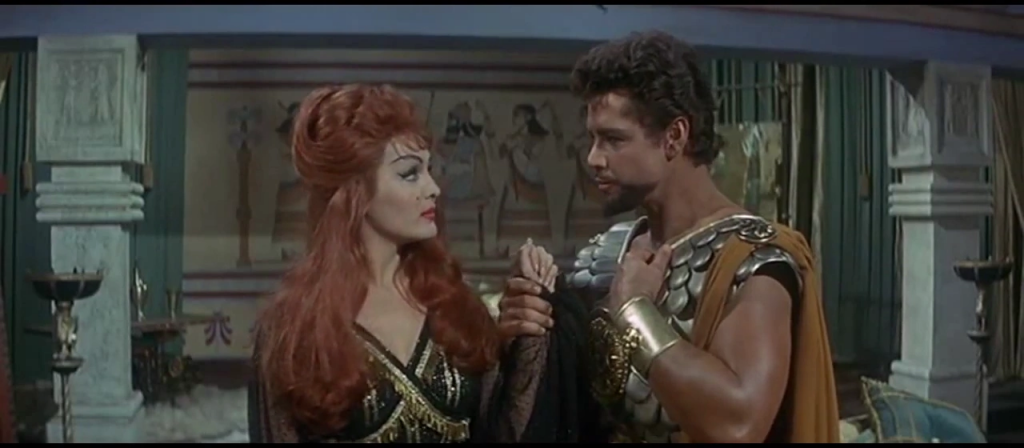
See all Sword and sandal resources.
- Director – Siro Marcellini
- Music – Carlo Franci, Argentinian composer/conductor (we’ll be hearing from him again in other movies)
- Gordon Scott – Nippur
- Genevieve Grad – Tamira, blonde slave girl Nippur falls for
- Andrea Scotti – Namar, Nippur’s sidekick/friend
- Moira Orfei – Ura, evil queen of Babylon
- Piero Lulli – Balthazar, evil king of Babylon
[ IMDB | Stream (Amazon) | Wikipedia ]
I’ve started my immersion into the Italian sword-and-sandal (aka peplum or maciste) films of the 60s. (Maciste is somewhat of a subgenre or strongman character type that is usually translated in titles as Hercules, Goliath, or Samson.) I was watching Danger!! Death Ray on MST3K [ IMDB | IMDB (MST3K) | Wikipedia ] and while researching the actors and trivia and etc. saw that one of the leads, Gordon Scott, was known for his roles in Tarzan and peplum films. I remember watching the Sinbad movies when I was young (The 7th Voyage of Sinbad and The Golden Voyage of Sinbad) and these Italian films–though much lower quality–remind me of that adventure-fantasy fun.
First up are as many of the 13 The Sons of Hercules films that I can find streaming. This choice was somewhat arbitrary, but might be a good representation since the series is actually a grouping of unrelated films artificially gathered for syndication in the US by Embassy Pictures. Should be a good range of stories. I’ll be starting, appropriately, with the two Gordon Scott films included in the series.
Notes:
- The opening theme song (pasted on by the American distributor) is wacky, spaghetti-western balladry. Apparently created in an attempt to tie the 13 flicks together. Really breaks the mood.
- Poor quality transfer, but I doubt Criterion will ever be releasing a restored version.
Story:
A fires shoots across the sky and the watching slaves believe it is a sign, but are unsure whether is bodes good or ill.
Nippur and his friend Namar return to Babylon from Persia and find that King Bathazar has been enslaving the people of the surrounding regions while his queen, Ura, burns slave-women to death as an offering to the goddess Ishtar.
Nippur and Namar save the escaping slave-girl Tamira and hides her with an old farmer and his daughters. They promise to return after they find the rebel Licardio. After arriving in Babylon, Nippur, who had been part of Balthazar’s army, goes to the him try to convince him to end his enslavement and ritual sacrifices. Namar goes to his wife Agar only to have her kidnapped by the king’s soldiers and imprisoned, ultimately intended to be sacrificed.

Queen Ura tries to conspire with Nippur to use the rebels to kill Bathazar so that the two of them can rule Babylon. He refuses. The rebels, along with Namar, attend the next royal sacrifice with the intent of killing the king. Nippur sees that it’s a setup for the rebels and attempts to stop Agar from being sacrificed. He is chased out by the palace guards, the rebels flee, and Agar is ultimately sacrificed.
The Persians attack, overrun the Babylonian army in the countryside and reach the walls of the city. Inside, Nippur is captured and imprisoned. Because he is not able to open the city gates, the Persians are thwarted and must retreat. After they take Tamira away to be sacrificed, Nippur escapes and frees the other prisoners.
Atop the battlements, an archer shoots a flaming arrow across the sky, summoning the Persians back from retreat.

The prisoners battle the city guards throughout the streets and into the royal court. Just before Tamira is sacrificed, Nippur arrives at the court and saves her. While fleeing, Queen Ura falls into the sacrificial fire. The rebels arrive and defeat the soldiers, the Persion enter after overrunning the city, and Nippur kills Balthazar. Nippur is crowned king and after he frees the slaves to return to their homelands, he summons back Tamira to make her his queen.